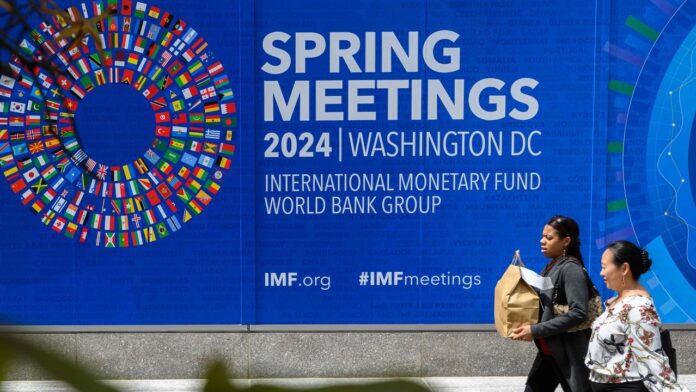[ad_1]
Australia is expected to lag behind its peers in reducing inflation and boosting economic growth, the International Monetary Fund has warned, as Treasurer Jim Chalmers prepares to attend a a series of high-level talks in Washington.
With less than a month until the May budget, Dr Chalmers will leave the country on Thursday to attend meetings with his counterparts at the G20, IMF and World Bank.
The economic slowdown in China, escalating tensions in the Middle East and the prospect of delayed interest rate cuts weighing on the global economy are expected to dominate talks.
“These evolving global conditions make it an important time to engage with my counterparts and international institutions as we put the final touches on the May budget,” Dr Chalmers said on Tuesday.
In its latest World Economic Outlook, released on Tuesday, the IMF forecast that average headline inflation in Australia would ease to 3.5 per cent in 2024, down from its October projection of 4 per cent. It currently is 4.1 per cent.
But consumer price growth would still be 3 per cent on average through 2025, the projections showed, at the top of the RBA’s 2 to 3 per cent target band.
Other advanced economies are expected to do better than Australia on reducing prices, with the median inflation rate set to ease to just 2.4 per cent in 2024, and fall further to just 2 per cent by 2025.
In some developed economies, including Australia, inflation has tracked sideways in recent months, prompting cautions from the IMF.
“While inflation trends are encouraging, we are not there yet,” said Pierre-Olivier Gourinchas, the IMF’s chief economist.
“Somewhat worryingly, progress toward inflation targets has somewhat stalled since the beginning of the year.
“This could be a temporary setback, but there are reasons to remain vigilant.”
The IMF says much of the good news on inflation to date has come from the decline in energy and goods prices, which could make further progress in sectors like insurance and housing more difficult.
“Services inflation remains high – sometimes stubbornly so – and could derail the disinflation path. Bringing inflation down to target remains the priority,” Mr Gourinchas warned.
Even still, the IMF said the likelihood of a hard landing for the global economy – that is inflation returning to target while triggering a recession – had receded since its previous analysis in October 2023.
On measures of economic growth, the updated set of forecasts also showed Australia would fall behind the global average, even as the fund’s economists upgraded its projections.
Australia’s economy is forecast to expand by 1.5 per cent this year, up from 1.2 per cent projected in October, with growth to accelerate to 2 per cent in 2025.
At the same time, the global economy is projected to expand by 3.2 per cent in 2024, up 0.3 points from its October estimate, with this rate expected to continue through 2025.
Mr Gourinchas added that economies had benefited as financial conditions had eased and market valuations soared. Capital flows to most emerging market economies excluding China had also been buoyant, while some low-income economies had additionally benefited from increased market access, he said.
Nevertheless, the projections fell short of the long run historical average of 3.8 per cent, due to high interest rates and less government spending.
Sounding the alarm on historically wear medium-term global growth which is forecast to be just 3.1 per cent in 2029 – its lowest level in decades – the IMF apportioned the blame on weak productivity growth.
“A significant part of the decline comes from increased misallocation of capital and Labor within sectors and countries. Facilitating faster and more efficient resource allocation can help boost growth,” Mr Gourinchas said.
The concerns echo similar comments from Productivity Commission chair Danielle Wood, who last week cautioned that green manufacturing subsidies unveiled by the Albanese government risked making Australia’s economy more inefficient and could create a class of business reliant on support.
The IMF’s economists also warned of significant risks that could undermine the global economy, including uneven growth between advanced and developing countries, heightened geopolitical tensions in the Middle East, continued weakness in the Chinese economy, and excessive government spending.
Separate analysis released by the Washington-based fund earlier this month found Australian borrowers were the most vulnerable to rate hikes in the world, due to the overwhelming share of variable-rate mortgages, high levels of household debt, and constraints on new housing supply.
The IMF, which counts 190 countries, including Australia, among its members, promotes financial stability and monetary co-operation, and is a lender of last resort to nation’s experiencing financial distress.
[ad_2]
Source link


